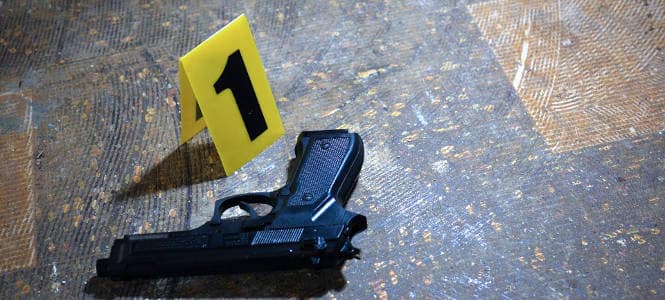

Murder, CA Penal Code 187, is defined as “the unlawful killing of a human being or a fetus with malice aforethought”.
Malice aforethought can be defined simply as, you meant to kill the victim. Malice pertains to when:
There are three levels of severity for murder in California under Penal Code 187: First-degree murder, Second-degree murder and Manslaughter.
You can be convicted of first-degree murder for performing any of the three actions by:
If you are found guilty of any of the offenses listed above and a person died as a result of you committing the crime then you will be tried under the felony-murder rule.
Second-degree applies to any murder that was willful but not premeditated. Second-degree cases also are covered under the felony-murder rule and are assessed on a case-to-case basis.
Third-degree in California is known as manslaughter.
Capital murder is the most heavily punished type of murder in California and is known as first-degree murder with special circumstances. If found guilty of capital murder you will either be sentenced to death row or a state prison sentence for life without the possibility of parole. You can be charged with capital murder if you performed any of the following including, but not limited to:
NOTE: The death penalty is not allowed to be carried out as of March 2019, because executions were halted by an official moratorium ordered by Governor Gavin Newsom.
The sentencing for each type of murder can vary substantially depending on a defendant’s criminal record and the details of the case. Here we will list the typical sentences for each crime.
If convicted of first-degree murder under PC 187 you will be sentenced to 25 years to life in state prison. This means that you must serve at least 25 years before being eligible for early release on parole. However, if it can be proven by the prosecutor that you committed the murder because of the victim’s race, religion, gender, etc. then you will be sentenced to life in prison without the possibility of parole, meaning you will spend the rest of your life in state prison.
If convicted of second-degree murder under PC 187 you will be sentenced to 15 years-to-life in state prison. Meaning you will spend a mandatory 15 years in prison before being eligible for early release on parole. Additionally, if the murder victim was a police officer or was killed during a drive-by shooting then the charges increase dramatically.
If during the murder, CA Penal Code 187 you used a firearm then you will serve an additional 10, 20, or 25-years to life state prison sentence. You will also receive a strike on your record, pay up to $10,000 in fines, pay victim restitution and will lose your right to own or possess a firearm.
In order for a prosecutor to convict you of murder, CA Penal Code 187, regardless of the degree, he/she must prove the three elements of the crime:
If the prosecutor cannot definitively prove that you murdered someone in accordance with the three elements of the crime then you will not be found guilty.

There are several strategies that an effective criminal defense attorney can implement to have a case dropped or the charges reduced.
The first defense that an attorney will explore is making sure the murder was not committed as an act of self-defense. The state protects people from being punished if they kill another person while protecting themselves, but only if violence is the sole way to avoid:
If you commit a murder because you truly feared that someone was going to take your life then you are protected by the state’s self-defense laws. This defense only works though if there were not any options to escape and your only way to stay alive or avoid great bodily injury is to kill your attacker.
The second approach your criminal defense attorney will take is to prove that the murder was an accident. If, at the time of the murder, you:
If the murder was performed while you were acting in any of the three ways mentioned above then proving the incident was an accident is a valid California legal defense.
The next approach is to plead not guilty by reason of insanity. If your attorney can prove that you:
Then a viable option is to plead not guilty by reason of insanity. The insanity plea is governed by the M’Naghten test and states, “A person is not responsible for criminal conduct if at the time of such conduct as a result of mental disease or defect he lacks substantial capacity either to appreciate the criminality [wrongfulness] of his conduct or to conform his conduct to the requirements of law” [2]. This defense strategy can be hard to prove is a defendant does not have a record of mental disability.
Your criminal defense attorney will also make sure the prosecutor’s evidence against you was properly seized in accordance to California’s search and seizure laws. If the police went beyond their power to search your person and property and illegally obtained evidence then your criminal defense attorney will try to have that evidence excluded from the trial. By having the prosecutor’s evidence excluded from trial, your criminal defense attorney will severely weaken their case and better your chances to have your charges reduced or dismissed.
An effective criminal defense attorney can also prove your innocence by proving that you’ve been wrongfully identified. In murder cases weapons are often used and people subsequently become fixated on the weapon and not the person holding the weapon, leading to a number of mistaken identity cases. The goal of your criminal defense attorney is to prove that there is reasonable doubt in the identity of the murderer. If your criminal defense attorney can show to the court that the prosecutor’s witnesses have doubts about who committed the crime then the outcome will likely be favorable for the defendant.
If you or a loved one is being charged with Murder, we invite you to contact our California criminal defense attorney immediately for a free case review. Our experienced and assiduous California Criminal Defense Lawyers will be sure to fight until the end to reduce or drop your charges completely.
Call LAW MART for a FREE Case Review: 310-894-6440

Copyright © 2024 law – Powered by AmelCS